By Emily Leas | Photographed by Hillary Schave
Shot on location at Hybrid Athletics, Fitchburg
It’s been almost 50 years since the passage of Title IX, a federal law preventing discrimination based on gender in education programs, including sports. The landmark 1972 legislation leveled the playing field for women and girls in federally funded athletic programs, including those at colleges, helping set the stage for their participation in club and professional sports.
Yet, women are still fighting for equal pay and opportunity at all levels, from the high school hockey rink to the world-class pitches of professional soccer.
But, as many girls and women find, the benefits of physical activity—from solo pursuits to team sports—are worth the fight. Athletics can make women better collaborators and better leaders, experts say, and help them stay fit and focused amid all the other duties they still juggle in our society.
Kris Eiring, a licensed psychologist with a certification in sports psychology, points out that about 94 percent of female executives played sports.
“As women become more competitive and more athletic, they’re exposed to the same on-the-field conditions as men,” she says. “They have to focus and fight for a spot. That competitive edge can transfer out to the professional world.”
And the spider web of opportunity that Title IX created continues to expand as more women break down the barriers of what is considered “traditional.” For example, 48 colleges in the U.S. now offer varsity women’s wrestling programs. And, according to USA Hockey, women’s registration in the 2017-2018 season was 6.5 times greater than men’s.
However, Eiring points out, Title IX created another opportunity…for men: coaching roles. Historically women’s teams were coached by volunteers, typically female. As these became paid positions, they are often snatched up by men.
Alicia Pelton knows firsthand the importance of having female coaches. As a former athlete and the founder of the Athletic Leadership Alliance, she drives advocacy and change in women’s sports.
“Girls are more sensitive to coaching than boys are. It’s a trust issue, it’s a communication issue.” Pelton explains. “Girls have more multitasking minds and boys tend to be more focused. Girls tend to feel good socially and emotionally. It’s important to understand all of that.”
In recent years, sports medicine practitioners have turned their attention to the unique physical needs of female athletes. Dave Knight, sports performance program manager for UW Health Sports Medicine, explains that puberty is a critical time for preventing future injuries in female athletes.
“During puberty when girls are putting on mass, they’re not getting stronger and this puts them at greater risk for injury,” Knight says. “We have to focus on building strength during this time.”
Knight’s programs for young female athletes emphasize a strong movement vocabulary to create stability and core strength.
“If we can build this in the early phases of their adult maturity, there’s a high probability they’ll take those movement mechanics into adulthood and we reduce that risk of injury even further.”
Young female athletes are up to six times as likely to tear their ACL, a knee ligament, and have higher rates of stress fractures.
Erin Hammer, a family medicine physician focusing on sports medicine and one of the team doctors for UW- Madison Athletics, says that bodies exposed to testosterone have more bone mineral density at baseline, reducing the chance of stress fractures, but there are other factors that put women at risk for bone stress injuries.
“Female athletes are more at risk for disordered eating, and being underweight means their bodies aren’t producing the hormones to protect their bone mineral density,” she says. On top of that, women are often involved in sports that emphasize leanness, which follows that same pathway.
A surprising trend that she sees at her new Women’s Sports Medicine Clinic with her partner Jenny Kempf, a physical therapist, is that female recreational athletes in sports like running marathons and cycling don’t identify as athletes.
“That’s not a phenomenon we see in males as much,” she says. “So we’re trying to change that paradigm. We need to help women understand the resources available to them and help them see themselves as worthy of seeking out those resources.”
We chatted with a few local gals involved in athletics about the impact it has on their lives and how they’re helping other girls and women (and men) to seek equality on and off the field.
Maureen Busalacchi
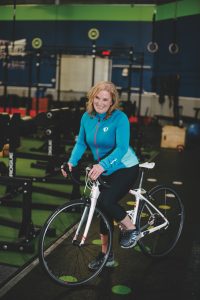 After two knee surgeries, Maureen Busalacchi knew her running days were over. Not one to sit still, this mom, wife and busy professional needed a new outlet. She found it in cycling in 2010 as she entered her 40s.
After two knee surgeries, Maureen Busalacchi knew her running days were over. Not one to sit still, this mom, wife and busy professional needed a new outlet. She found it in cycling in 2010 as she entered her 40s.
Her competitive nature pushed her to fit training into her busy schedule with early morning weekend rides and by finishing the last 15 miles of her commute to Milwaukee on her bike. A program officer for Advancing a Healthier Wisconsin Endowment at the Medical College of Wisconsin, Busalacchi makes every mile count.
“You have to get picky about what you do to stay active and when you can do it to make sure you can meet your family and work obligations. You don’t want to be working out and feeling guilty that you’re not at home,” she says.
As she notes, cycling gives more than it takes.
“I can be completely in the moment instead of distracted about other things. There’s something about how it settles your mind that is so important. It’s that rhythm.”
The tight bonds formed with her cycling friends and the chance to find and test her own limits keep her coming back to her bike.
“My goal is to bike until I’m 100. I don’t care if it’s an adult tricycle, I just want to stay active at whatever speed makes sense.”
Venus Washington
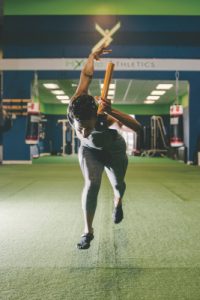 Track and field was not on Venus Washington’s radar when she was young, even though she could beat her older cousins in any foot race. Then she learned about Marion Jones, the world champion track star and professional basketball player. Washington, who grew up in Milwaukee and had also played basketball, realized she could put her speed to use off the court, too.
Track and field was not on Venus Washington’s radar when she was young, even though she could beat her older cousins in any foot race. Then she learned about Marion Jones, the world champion track star and professional basketball player. Washington, who grew up in Milwaukee and had also played basketball, realized she could put her speed to use off the court, too.
Washington focused on long jump and sprints in high school and as a UW-Madi- son athlete. She later coached at UW-Madison, then at Madison East High School.
She founded Madison Elite Track Club, where she is a coach and occasional competitor. She also is a certified health and wellness coach running her own business, R U Fit.
She says she strives to get her clients to listen to their bodies and to the power within themselves.
“If you stop and breathe and intentionally move your body, you might find you’re stronger than you thought,” she explains.
She knows that’s a particularly critical message in the African-American community. “You may feel like you don’t have a voice, but then you start investing in your health and now you feel empowered. Now your voice is different.”
When women show up, she says, they make a shift.
“If we’re not investing in ourselves and our health, that shift is not going to be sustainable. That’s the power of health and wellness.”
LaRonda McLin
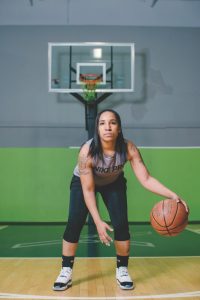 LaRonda McLin was always the only girl playing basketball with the boys growing up on Madison’s East Side.
LaRonda McLin was always the only girl playing basketball with the boys growing up on Madison’s East Side.
“I felt like if I could be one of the better players among the boys, then I could be really good,” McLin says.
And she was. A standout career at Madison East High School led to two years
at Carthage College in Kenosha, Wisconsin. Persistent injuries ended her college career, but she was snatched up as a coach by Madison School and Community Recreation when she returned to Madison, and is now the community learning center director for MSCR as part of the Madison Metropolitan School District.
McLin discovered a love for coaching and training the next generation of girls. She landed the job as the girls’ JV coach at East High School in 2015, then joined Madison West High as the girls’ varsity assistant and JV head coach in 2018.
From her perspective, as girls move from middle to high school, they transition from learning skills to learning their role on the team.
“By building a positive relationship with these girls, I can get so much more out of them,” says McLin. “There is a broad range of skills on any team, and that’s why it’s so important we instill confidence no matter their role.”
When McLin isn’t coaching, training, working and being a mom, you can still find her on the court, practicing her shots and playing with the MSCR adult rec league.
“It’s so important to set aside that time to do something you love. For me that’s reading and basketball. That’s for my own wellness.”
Emma Zoch
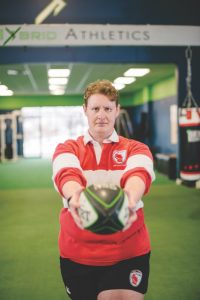 Emma Zoch had never played sports when a friend asked her to join a local rugby club team during her senior year at Madison East High School.
Emma Zoch had never played sports when a friend asked her to join a local rugby club team during her senior year at Madison East High School.
“I went to two practices and then I was in a game,” says Zoch. “That’s pretty common in rugby because it’s often hard to find girls to play at that level, and it’s the best way to learn.”
Zoch fell in love with the team camaraderie and physical intensity of the sport and ended up playing on the club team at the University of Minnesota. After graduating, she joined the Wisconsin Women’s Rugby Football Club in Madison. In her nine years with the club, she has served as its president for two years and helped the team to a national championship in 2015.
She’s excited to see more colleges starting to offer rugby as a varsity sport, which drives more high schools to offer the sport and gives girls something to strive for.
She says her sedentary lifestyle in high school probably would have led her down a different path, were it not for that first invitation to play rugby.
“Rugby made a really big impact on my life,” she says. “I had very low confidence back in high school and rugby made me more comfortable with myself and with leading groups. That has made me want to stay in the sport and to help it grow.”
Kaya Pelton-Byce & Grace Bonnell
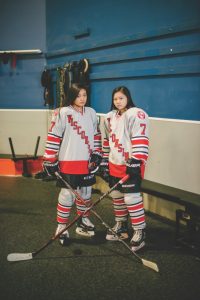 Kaya Pelton-Byce and Grace Bonnell come from hockey families and they’ve played since they could walk. Now the two 14-year-olds play for the local club team, Madison Mavericks, and the Tier 1 Team Wisconsin, which combines 14-19-year-old girls and boys from around the state into three teams based on age and gender.
Kaya Pelton-Byce and Grace Bonnell come from hockey families and they’ve played since they could walk. Now the two 14-year-olds play for the local club team, Madison Mavericks, and the Tier 1 Team Wisconsin, which combines 14-19-year-old girls and boys from around the state into three teams based on age and gender.
Kaya and Grace are used to playing with and against boys since there’s often not enough female players to form a team.
The two played their way into the “boys club.”
“When I was younger, the boys wouldn’t pass to me or associate with me,” says Grace. Kaya adds, “It changed when they realized we were good.” Grace jokes, “They getreally salty about it.”
Both girls admit winning isn’t what drives them to be better. It’s more about the friendships and fun they have working together for something bigger. But when they dedicate their precious social time to practice four days a week, plus play in tournaments every weekend, they demand the same amount of respect the boys get.
And they know when they’re not getting it. Sometimes the ref calls them “sweetie,” and slower, less-skilled boys target them simply because of their gender.
Grace and Kaya no longer compete against boys in games. The genders split at age 14 when the boys’ testosterone kicks in. But the girls still practice with the boys in regional sessions with Team Wisconsin.
“Last year we didn’t even know the practices were happening. We had two practices as a team before we went to Nationals,” explains Kaya.
When the boys’ team coaches took over the girls’ team this season, Grace says they were finally treated like equals.
Next, it’s off to high school hockey. On the Memorial High team alone, up to nine girls will join from their club team, a testament to the growth of girls’ hockey in the Madison area.
Meghan Skrepenski, Strong Girls Boot Camp
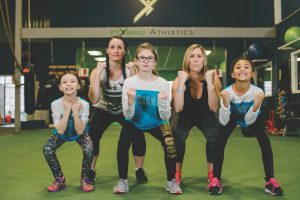 As the mother of two pre-teen girls, Meghan Skrepenski has watched mean-girl mentality creep into the lives of elementary school-age kids. Two years ago, she decided to help give her daughters, and all girls, a voice to stand up to bullying and the negativity fomented by social media.
As the mother of two pre-teen girls, Meghan Skrepenski has watched mean-girl mentality creep into the lives of elementary school-age kids. Two years ago, she decided to help give her daughters, and all girls, a voice to stand up to bullying and the negativity fomented by social media.
Using her 18-year military career and background in physical and health education, Skrepenski started Strong Girls Boot Camp in Madison.
Her eight-week boot camps start each session with a true boot camp mindset: working up a sweat, and going in as an individual and coming out as a team.
The boot campers then move into self-affirmations, a big part of the weekly sessions.
“We talk about how you are awesome, I am awesome, we are awesome,” Skrepenski says. “It’s so important for girls to get comfortable with that…it lets them stand up when something isn’t right. It builds resiliency.”
Teri Thomas and her 8-year-old daughter Adella have attended Strong Girls Boot Camp the last two summers. Thomas says it’s made a positive impact on Adella.
“It was a way to get Adella around other girls her age, build self-esteem and build on the positivity her dad and I try to teach at home,” says Thomas.
When she asks Adella her favorite part of the boot camp, Adella says it’s the self-affirmations.
“Her favorite is ‘I am bold,’” says Thomas. “It’s amazing to hear that from an 8-year-old.”

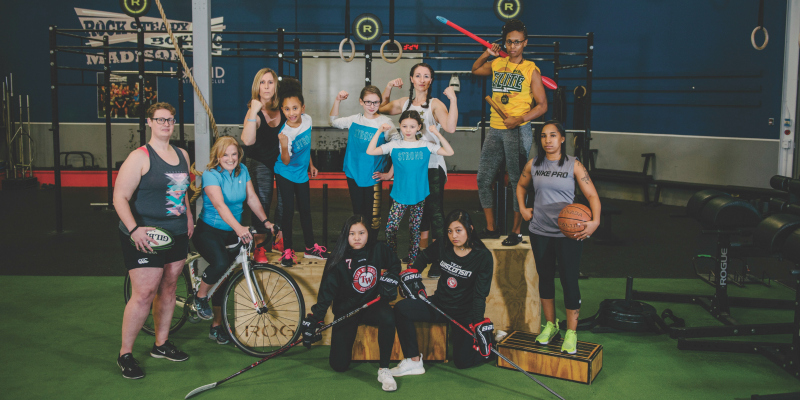

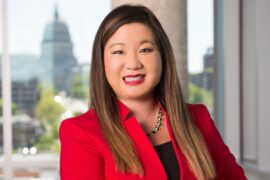
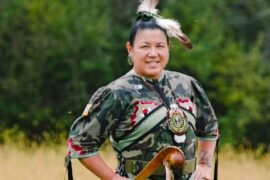
Comments are closed.